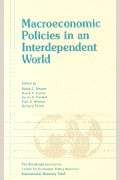The papers in this volume cover a range of issues concerned with macroeconomic interdependence and policymaking. The volume begins with two broad surveys: the first gives an overview of the issues involved in international coordination of economic policies and considers the benefits to be gained from coordination; the second surveys empirical evidence on macroeconomic interactions in the world economy. These are followed by a group of papers that evaluate alternative rules or regimes for the international macroeconomy, using empirical multicounty macromodels. The volume then turns to studies concerned with more specific policy issues: the target zone proposal; the European Monetary System as a possible example for the international economy; and plans for a European central bank. A subsequent paper examines more general institutional questions concerned with policy coordination and the role of international organizations in the process. And the final paper takes up a neglected but important issue: macroeconomic interdependence between industrial and developing countries, and the implications of these interactions for international policy coordination.
In the paragraphs that follow, we briefly identify some main points made in each of the papers and indicate some reactions contained in the discussants’ comments.
Co-published with the Centre for Economic Policy Research
Authors


